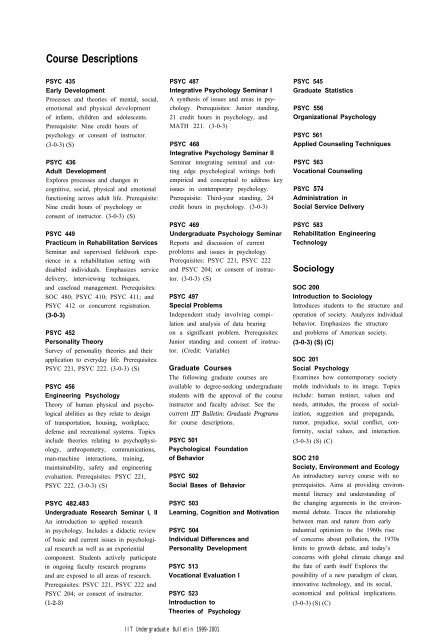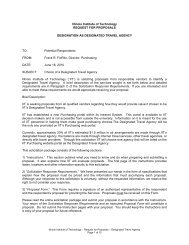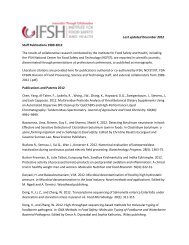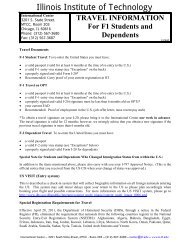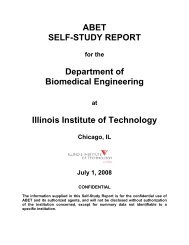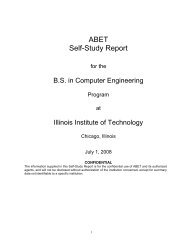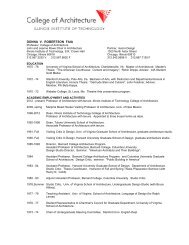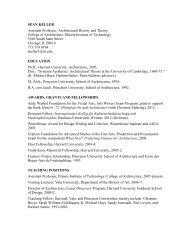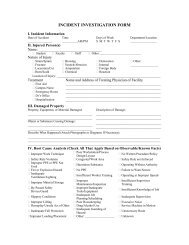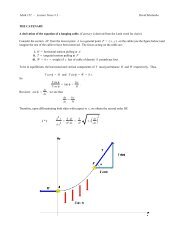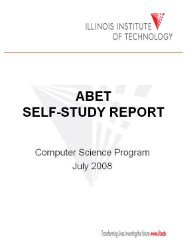Copyright & Disclaimer Information - Illinois Institute of Technology
Copyright & Disclaimer Information - Illinois Institute of Technology
Copyright & Disclaimer Information - Illinois Institute of Technology
You also want an ePaper? Increase the reach of your titles
YUMPU automatically turns print PDFs into web optimized ePapers that Google loves.
Course Descriptions<br />
PSYC 435<br />
Early Development<br />
Processes and theories <strong>of</strong> mental, social,<br />
emotional and physical development<br />
<strong>of</strong> infants, children and adolescents.<br />
Prerequisite: Nine credit hours <strong>of</strong><br />
psychology or consent <strong>of</strong> instructor.<br />
(3-0-3) (S)<br />
PSYC 436<br />
Adult Development<br />
Explores processes and changes in<br />
cognitive, social, physical and emotional<br />
functioning across adult life. Prerequisite:<br />
Nine credit hours <strong>of</strong> psychology or<br />
consent <strong>of</strong> instructor. (3-0-3) (S)<br />
PSYC 449<br />
Practicum in Rehabilitation Services<br />
Seminar and supervised fieldwork experience<br />
in a rehabilitation setting with<br />
disabled individuals. Emphasizes service<br />
delivery, interviewing techniques,<br />
and caseload management. Prerequisites:<br />
SOC 480; PSYC 410; PSYC 411; and<br />
PSYC 412 or concurrent registration.<br />
(3-0-3)<br />
PSYC 452<br />
Personality Theory<br />
Survey <strong>of</strong> personality theories and their<br />
application to everyday life. Prerequisites:<br />
PSYC 221, PSYC 222. (3-0-3) (S)<br />
PSYC 456<br />
Engineering Psychology<br />
Theory <strong>of</strong> human physical and psychological<br />
abilities as they relate to design<br />
<strong>of</strong> transportation, housing, workplace,<br />
defense and recreational systems. Topics<br />
include theories relating to psychophysiology,<br />
anthropometry, communications,<br />
man-machine interactions, training,<br />
maintainability, safety and engineering<br />
evaluation. Prerequisites: PSYC 221,<br />
PSYC 222. (3-0-3) (S)<br />
PSYC 482.483<br />
Undergraduate Research Seminar I, II<br />
An introduction to applied research<br />
in psychology. Includes a didactic review<br />
<strong>of</strong> basic and current issues in psychological<br />
research as well as an experiential<br />
component. Students actively participate<br />
in ongoing faculty research programs<br />
and are exposed to all areas <strong>of</strong> research.<br />
Prerequisites: PSYC 221, PSYC 222 and<br />
PSYC 204; or consent <strong>of</strong> instructor.<br />
(1-2-3)<br />
<strong>Copyright</strong> & <strong>Disclaimer</strong> <strong>Information</strong>: <strong>Copyright</strong> © 1994, 1995, 1996, 1997, 1998, 1999, 2000, 2001, 2002, 2003, 2004, 2005, 2006, 2007. CollegeSource®, Inc. and Career Guidance Foundation. CollegeSource® digital catalogs are derivative works owned and copyrighted by CollegeSource®, Inc. and Career Guidance Foundation. Catalog content is owned and copyrighted by the appropriate school. While CollegeSource®, Inc. and Career Guidance Foundation provides information as a service to the public, copyright is retained on all digital catalogs.<br />
<strong>Copyright</strong> & <strong>Disclaimer</strong> <strong>Information</strong>: <strong>Copyright</strong> © 1994, 1995, 1996, 1997, 1998, 1999, 2000, 2001, 2002, 2003, 2004, 2005, 2006, 2007. CollegeSource®, Inc. and Career Guidance Foundation. CollegeSource® digital catalogs are derivative works owned and copyrighted by CollegeSource®, Inc. and Career Guidance Foundation. Catalog content is owned and copyrighted by the appropriate school. While CollegeSource®, Inc. and Career Guidance Foundation provides information as a service to the public, copyright is retained on all digital catalogs.<br />
PSYC 487<br />
Integrative Psychology Seminar I<br />
A synthesis <strong>of</strong> issues and areas in psychology.<br />
Prerequisites: Junior standing,<br />
21 credit hours in psychology, and<br />
MATH 221. (3-0-3)<br />
PSYC 468<br />
Integrative Psychology Seminar II<br />
Seminar integrating seminal and cutting<br />
edge psychological writings both<br />
empirical and conceptual to address key<br />
issues in contemporary psychology.<br />
Prerequisite: Third-year standing, 24<br />
credit hours in psychology. (3-0-3)<br />
PSYC 469<br />
Undergraduate Psychology Seminar<br />
Reports and discussion <strong>of</strong> current<br />
problems and issues in psychology.<br />
Prerequisites: PSYC 221, PSYC 222<br />
and PSYC 204; or consent <strong>of</strong> instructor.<br />
(3-0-3) (S)<br />
PSYC 497<br />
Special Problems<br />
Independent study involving compilation<br />
and analysis <strong>of</strong> data bearing<br />
on a significant problem. Prerequisites:<br />
Junior standing and consent <strong>of</strong> instructor.<br />
(Credit: Variable)<br />
Graduate Courses<br />
The following graduate courses are<br />
available to degree-seeking undergraduate<br />
students with the approval <strong>of</strong> the course<br />
instructor and faculty adviser. See the<br />
current IIT Bulletin: Graduate Programs<br />
for course descriptions.<br />
PSYC 501<br />
Psychological Foundation<br />
<strong>of</strong> Behavior<br />
PSYC 502<br />
Social Bases <strong>of</strong> Behavior<br />
PSYC 503<br />
Learning, Cognition and Motivation<br />
PSYC 504<br />
Individual Differences and<br />
Personality Development<br />
PSYC 513<br />
Vocational Evaluation I<br />
PSYC 523<br />
Introduction to<br />
Theories <strong>of</strong> Psychology<br />
IIT Undergraduate Bulletin 1999-2001<br />
PSYC 545<br />
Graduate Statistics<br />
PSYC 556<br />
Organizational Psychology<br />
PSYC 561<br />
Applied Counseling Techniques<br />
PSYC 563<br />
Vocational Counseling<br />
PSYC 574<br />
Administration in<br />
Social Service Delivery<br />
PSYC 583<br />
Rehabilitation Engineering<br />
<strong>Technology</strong><br />
Sociology<br />
SOC 200<br />
Introduction to Sociology<br />
Introduces students to the structure and<br />
operation <strong>of</strong> society. Analyzes individual<br />
behavior. Emphasizes the structure<br />
and problems <strong>of</strong> American society.<br />
(3-0-3) (S) (C)<br />
SOC 201<br />
Social Psychology<br />
Examines how contemporary society<br />
molds individuals to its image. Topics<br />
include: human instinct, values and<br />
needs, attitudes, the process <strong>of</strong> socialization,<br />
suggestion and propaganda,<br />
rumor, prejudice, social conflict, conformity,<br />
social values, and interaction.<br />
(3-0-3) (S) (C)<br />
SOC 210<br />
Society, Environment and Ecology<br />
An introductory survey course with no<br />
prerequisites. Aims at providing environmental<br />
literacy and understanding <strong>of</strong><br />
the changing arguments in the environmental<br />
debate. Traces the relationship<br />
between man and nature from early<br />
industrial optimism to the 1960s rise<br />
<strong>of</strong> concerns about pollution, the 1970s<br />
limits to growth debate, and today’s<br />
concerns with global climate change and<br />
the fate <strong>of</strong> earth itself Explores the<br />
possibility <strong>of</strong> a new paradigm <strong>of</strong> clean,<br />
innovative technology, and its social,<br />
economical and political implications.<br />
(3-0-3) (S) (C)


